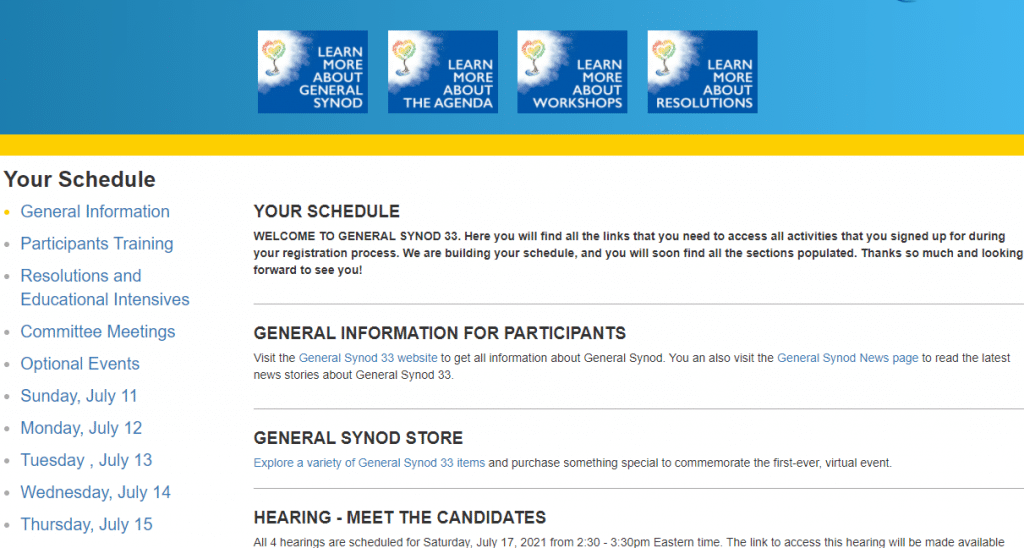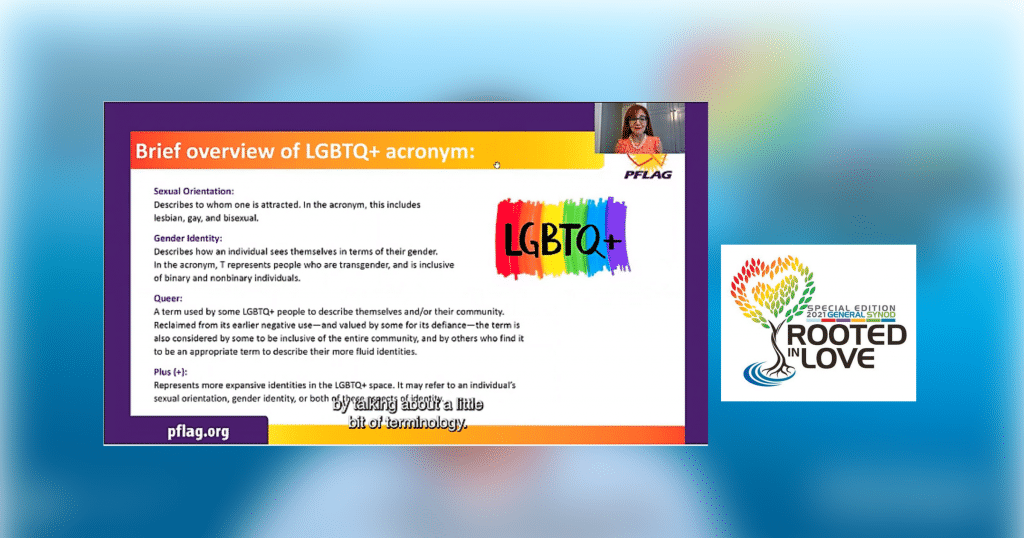Video educational intensives ready for review on meet.ucc
As members of the United Church of Christ gather for the denomination’s first virtual General Synod, one of the first changes “attendees” may notice is the new format of the traditional “educational intensives.”
Under the Synod’s standing rules, an educational intensive must be provided for every Resolution of Witness to help delegates understand the resolution’s background before they begin to discuss it in the committee to which they are randomly assigned. The sessions are led by persons other than those who proposed the resolution to General Synod, and traditionally, the Local Arrangements Committee recruited a local scholar or expert to brief delegates on the topics. But because of this year’s virtual format, UCC staffers were able to cast a wider net for experts, and delegates can choose when to watch the pre-recorded videos before they begin their committee work.
In the past, an educational intensive might support more than one resolution if the focus of the resolutions was similar. But David Anderson, one of the two staff members managing the resolution and committee process, said the resolutions for this General Synod were so varied that a separate video has been prepared for each one.
Most of the sessions run about 45 minutes, and close-captioning has been added.
The precise formats vary with the resolutions. Some feature long-time UCC leaders, sharing both background information about the resolution as well as their personal stories about how they became familiar with the issue involved. With one resolution, the “Declaration for Just Peace Between Palestine and Israel,” the video features an interview with Dr. Shibley Telhami, the Anwar Sadat Professor of Peace and Development at the University of Maryland and a senior fellow at the Brookings Institution.
The intensive for the resolution “encouraging to end 128 years of war between the United States of America and the Hawaiian Kingdom” features a 2015 program, led by S. James Anaya and Robert A. Williams Jr., two law professors with expertise on international law as it pertains to indigenous people. That discussion, longer than some of the others, was sponsored by the Indigenous Peoples Law and Policy Program at the University of Arizona College of Law.
Because the intensives will not compete with each other during the Synod agenda, delegates are free to watch as many as they wish. Most of them are now available to registrants through meet.ucc. The ‘Resolutions and Educational Intensives’ section is easily accessed after one logs in.

It is also anticipated that after General Synod, the videos will be made available for persons, including congregations, who may want to learn more about the background of the resolutions. For example, two of the educational intensives, one addressing “gender safety and equity in ministry settings,” and another, supporting a ban on the practice of “conversion therapy,” explain the differences in the way LGBTQ+ persons identify themselves, and clarify the differences embodied in the letters of that acronym.
In video statements introducing the intensive recordings, Synod staffers Anderson and Kevin Peterson invite delegates “to take notes, to be challenged, to listen with an open mind to the presenters” so that they can all “enter the committee time” with the same background information. Each video concludes with a recitation of the “prayer for discernment” that is traditionally shared with General Synod attendees.
The Rev. Loey Powell, who prepared the intensive for the resolution addressing “gender safety and equity in ministry settings,” reflected on some of the challenges of the past year in her video, which was recorded from a bedroom and punctuated by neighborhood noises in the background. Powell, who served as the last executive director of the UCC’s Coordinating Center for Women in Church and Society, began her presentation by saying, “I hope to be educational in this bit of time we have together.” Then she smiled and added, “I also hope not to be too intensive.”
Powell also acknowledged her audience, even if she could not see them. “I know that the work you are doing as committee members is important and that you’re having to have to attend a whole variety of Zoom intensives.” But she said she wanted to “provide some broader strokes of information and background that are relevant to this particular resolution as you take it under consideration.”
Sara Fitzgerald, General Synod News Team volunteer, is a member of Rock Spring Congregational UCC in Arlington, Va.
Related News
A Moment of Silence
The weekend news was alarming. Two students shot and killed with 9 injured at Brown University...
Read MoreIn hope-filled worship service, UCC and United Church of Canada celebrate full communion past and future
On Saturday, Dec. 13, many from the United Church of Christ (UCC) and the United Church of...
Read More‘A Gift of God to the World:’ Christmas greetings from the General Minister and President
As Christmas quickly approaches, UCC General Minister and President/CEO the Rev. Karen Georgia...
Read More


